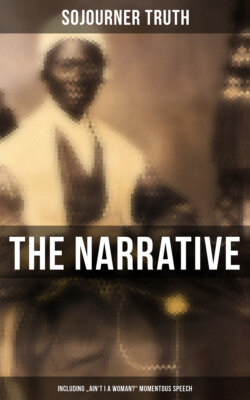Читать книгу The Narrative of Sojourner Truth (Including "Ain't I a Woman?" Momentous Speech) - Sojourner Truth - Страница 8
На сайте Литреса книга снята с продажи.
THE AUCTION
ОглавлениеTable of Contents
At length, the never-to-be-forgotten day of the terrible auction arrived, when the 'slaves, horses, and other cattle' of Charles Ardinburgh, deceased, were to be put under the hammer, and again change masters. Not only Isabella and Peter, but their mother, were now destined to the auction block, and would have been struck off with the rest to the highest bidder, but for the following circumstance: A question arose among the heirs, 'Who shall be burdened with Bomefree, when we have sent away his faithful Mau-mau Bett?' He was becoming weak and infirm; his limbs were painfully rheumatic and distorted-more from exposure and hardship than from old age, though he was several years older than Mau-mau Bett: he was no longer considered of value, but must soon be a burden and care to some one. After some contention on the point at issue, none being willing to be burdened with him, it was finally agreed, as most expedient for the heirs, that the price of Mau-mau Bett should be sacrificed, and she receive her freedom, on condition that she take care of and support her faithful James,- faithful, not only to her as a husband, but proverbially faithful as a slave to those who would not willingly sacrifice a dollar for his comfort, now that he had commenced his descent into the dark vale of decrepitude and suffering. This important decision was received as joyful news indeed to our ancient couple, who were the objects of it, and who were trying to prepare their hearts for a severe struggle, and one altogether new to them, as they had never before been separated; for, though ignorant, helpless, crushed in spirit, and weighed down with hardship and cruel bereavement, they were still human, and their human hearts beat within them with as true an affection as ever caused a human heart to beat. And their anticipated separation now, in the decline of life, after the last child had been torn from them, must have been truly appalling. Another privilege was granted them-that of remaining occupants of the same dark, humid cellar I have before described: otherwise, they were to support themselves as they best could. And as her mother was still able to do considerable work, and her father a little, they got on for some time very comfortably. The strangers who rented the house were humane people, and very kind to them; they were not rich, and owned no slaves. How long this state of things continued, we are unable to say, as Isabella had not then sufficiently cultivated her organ of time to calculate years, or even weeks or hours. But she thinks her mother must have lived several years after the death of Master Charles. She remembers going to visit her parents some three or four times before the death of her mother, and a good deal of time seemed to her to intervene between each visit.
At length her mother's health began to decline-a fever-sore made its ravages on one of her limbs, and the palsy began to shake her frame; still, she and James tottered about, picking up a little here and there, which, added to the mites contributed by their kind neighbors, sufficed to sustain life, and drive famine from the door.
